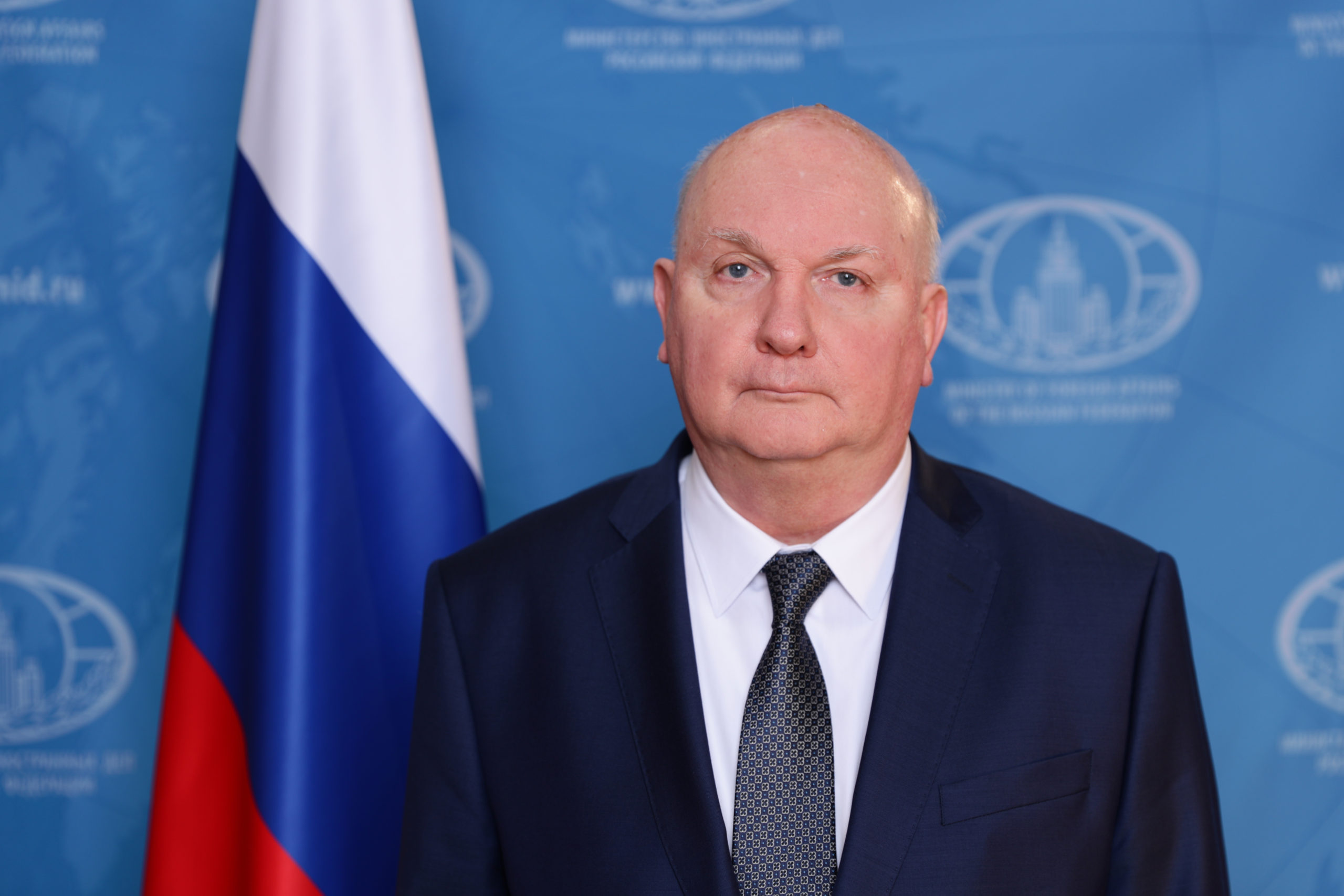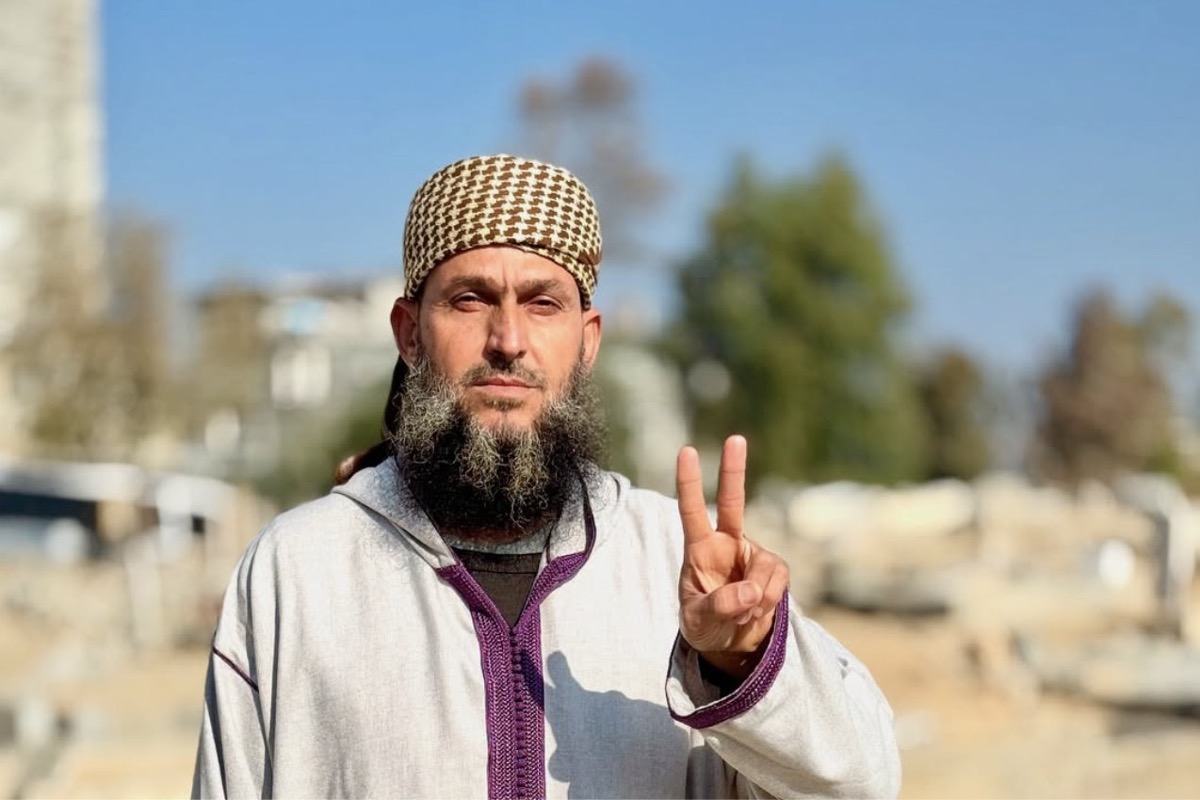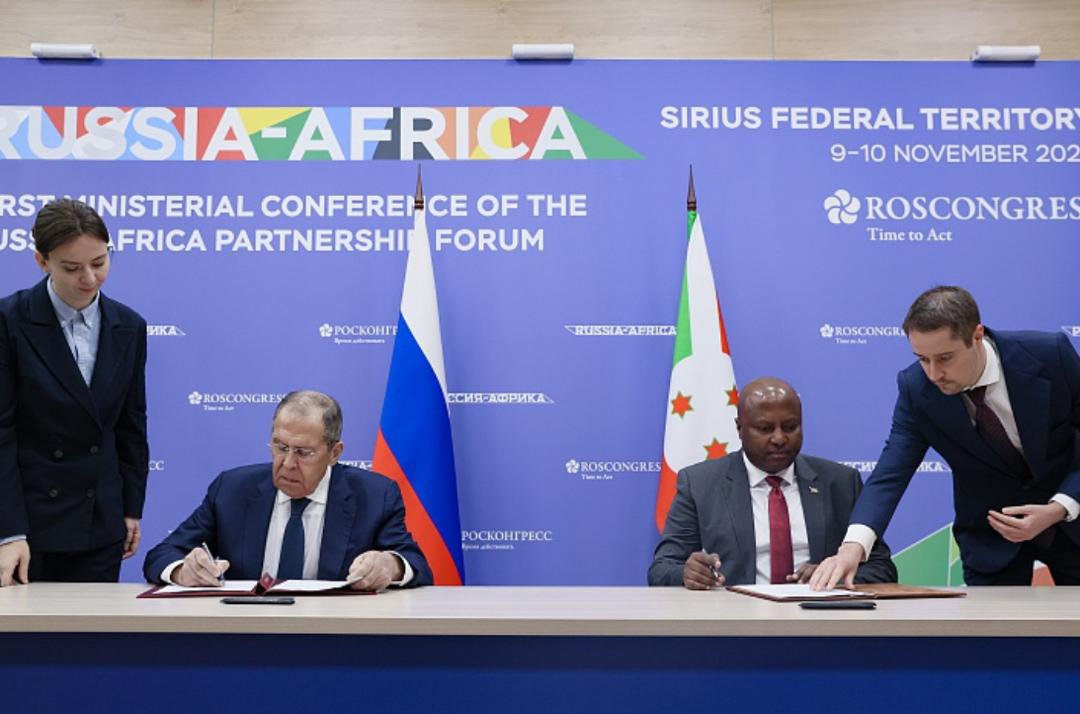
We, the Foreign Ministers of the Russian Federation and African States recognised by the United Nations (UN), Leadership of the African Union Commission and of executive bodies of the leading African integration organisations, as well as their representatives, gathered on 10 November 2024 in the Russian Federation, Sirius Federal Territory, to participate in the First Ministerial Conference of the Russia-Africa Partnership Forum.
We are pleased to note the strategic level of Russia-Africa cooperation, and positively assess the pace of the implementation of the agreements reached during the first (Sochi, 23-24 October 2019) and second (Saint Petersburg, 27-28 July 2023) Russia-Africa Summits and articulated in the final documents thereof, including the Russia-Africa Partnership Forum Action Plan 2023-2026.
We reconfirm our intention to continue strategic-level engagement in order to achieve a world order that would ensure international peace and security for all, equal opportunities for the development of all States, preservation of their cultural and civilizational uniqueness regardless of differences in political, economic and social structures, geographical location, demographic, resource and military potentials.

We welcome the adoption by heads of delegations participating in the First Ministerial Conference of the Russia-Africa Partnership of joint statements on measures to create a fair, transparent and equitable system of International Information Security; strengthening cooperation in the fight against terrorism; and current issues of exploration and use of Outer Space for peaceful purposes.
We reconfirm the shared responsibility of the Russian Federation and African States for supporting the creation of a just and stable world order based on the principles of sovereign equality of States, non-interference in their internal affairs, respect for sovereignty, territorial integrity and the right of all peoples to self-determination as provided for, inter alia, by UN General Assembly Resolution 1514 (XV) of 14 December 1960, as well as the need to preserve national identity and national resources, cultural and civilizational diversity and to protect traditional values.
We state our readiness to further coordinate actions in all areas of Russia-Africa relations underpinned by a mutual commitment – to strengthen dialogue and engagement within the Russia-Africa Partnership Forum – and based on the common interests of our countries and mutual benefit.
We support the aspirations of African States as enshrined in the African Union’s Agenda 2063: The Africa We Want and in the 2030 Agenda for Sustainable Development adopted by the UN General Assembly in its Resolution 70/1 of 25 September 2015.
We note the need to intensify our efforts for enhanced and mutually beneficial cooperation and to support Africa in the implementation of its priority development goals of the African Union’s Agenda 2063: The Africa We Want.
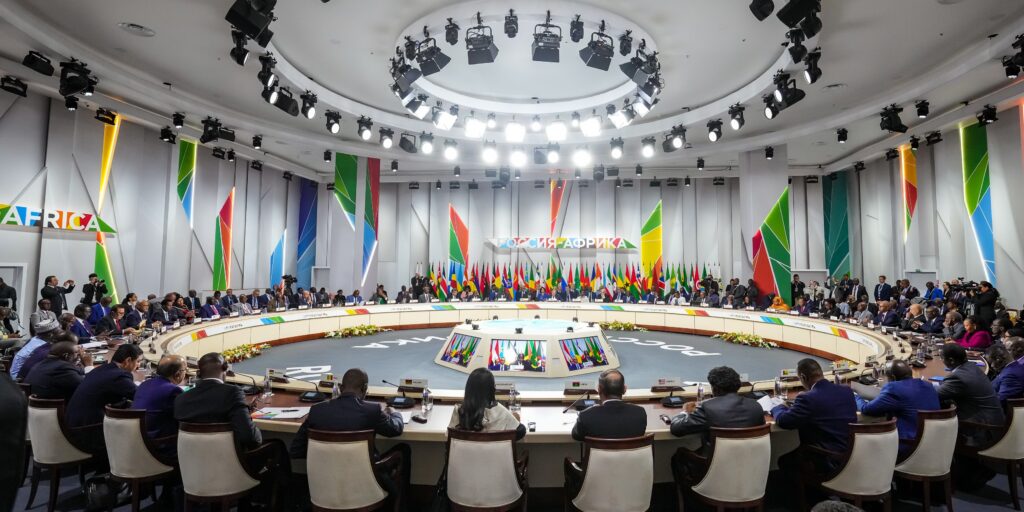
Political Cooperation
We acknowledge a significant increase in engagements at the highest political levels between the Russian Federation and African States and welcome the increase in mutual diplomatic presence both in the Russian Federation and on the African continent.
We reaffirm our commitment to consistently contribute to the strengthening of national sovereignty of the Russian Federation and African States based on norms of international law and national legislations, the African Union’s Agenda 2063 The Africa We Want and other strategic documents, as well as our readiness to develop multilateral formats with the leading participation of countries that respect the principle of sovereign equality of States.
We consider the development of constructive partnership with the African Union and the leading African integration organisations as a foreign policy priority of the Russian Federation and African States.
Russia recognises efforts undertaken by the African continent to accelerate the integration of the regions of the continent and advance economic development through the implementation of the First Ten Year Implementation Plan of Agenda 2063. African Ministers acknowledge and commend Russia for its willingness in supporting the Second Ten Year Implementation Plan toward the achievement of the aspirations and goals as contained in Agenda 2063, Africa’s strategic framework for its development.
Given the role of BRICS in promoting an equitable and inclusive system of international relations, based on just international order and the equality of all States we welcome BRICS openness to comprehensive work with African countries during the Russian Chairship in BRICS in 2024. We are pleased to note the decisions of the XVI BRICS Summit held in Kazan on 22-24 October 2024 aimed at promoting just global development and security, including through dialogues and partnerships that strengthen cooperation with the African States.
We reconfirm our joint aspiration for strengthening the central role of the UN in promoting inclusive multilateralism as well as preserving peace and security. Acknowledging the unfairness of the lack of permanent representation by African countries in the UN Security Council and the necessity of addressing the historical injustice against them, we stand ready to constructively engage on issues of reforming the UN Security Council in order to adapt it to the emerging multipolar world, which is accompanied by both new threats and opportunities, on the basis of a common position of African States, as embodied in the Ezulwini Consensus on United Nations Security Council Reform and the Sirte Declaration of 2005.
We welcome the broad support of the UN Member States for the Common African position, respecting its legitimacy, and for calls to ensure that the African continent is treated as priority and a special case in the UN Security Council reform process.
We welcome close cooperation on the UN platforms, including with non-permanent members of the UN Security Council from among African States, and other international organisations.
We reaffirm our commitment to joint efforts against any manifestations of neo-colonialism, violent and non-violent forms of exploitation of the resources of sovereign States and peoples. We support efforts to complete the process of genuine decolonisation of the African Continent under the UN leadership and in line with the provisions of its Charter.
We consider arranging joint work among national archive agencies to preserve the historical memory of the crimes and aftermath of the colonial era, as well as establishing a permanent coordination mechanism to develop and harmonise vision on completing Africa decolonisation process and organising an open archive database for the assessment of legal instruments for the compensation of colonial-era damages to African States and restitution of cultural property displaced in the process of colonial plundering, including within UN fora.
We intend to promote further strengthening of cooperation and support for mutual initiatives on international platforms to combat all manifestations of racism, racial discrimination as well as discrimination based on religion or origin including xenophobia and related intolerance, aggressive nationalism, neo-Nazism and neo-fascism, and resolve to cooperate together to achieve the full implementation of the 2001 Durban Declaration and Programme of Action (DDPA).
We are set for combatting the falsification of history, especially in light of the 2025 celebration of the 80th anniversary of the Victory over Nazism in the World War II.
We express readiness to support, through joint efforts, the depoliticisation of international criminal justice mechanisms, which must operate in full respect of the principle of the sovereign equality of States.
We agree to resist the politicisation of the international human rights agenda, and the work of all other technical bodies of the United Nations. We emphasise the importance of Russia-Africa inter-parliamentary cooperation. We further welcome the holding of regular Russia-Africa international parliamentary conferences, which contribute to strengthening the dialogue between the Federal Assembly of the Russian Federation, the Pan-African Parliament, national parliaments of African States and bilateral friendship groups.
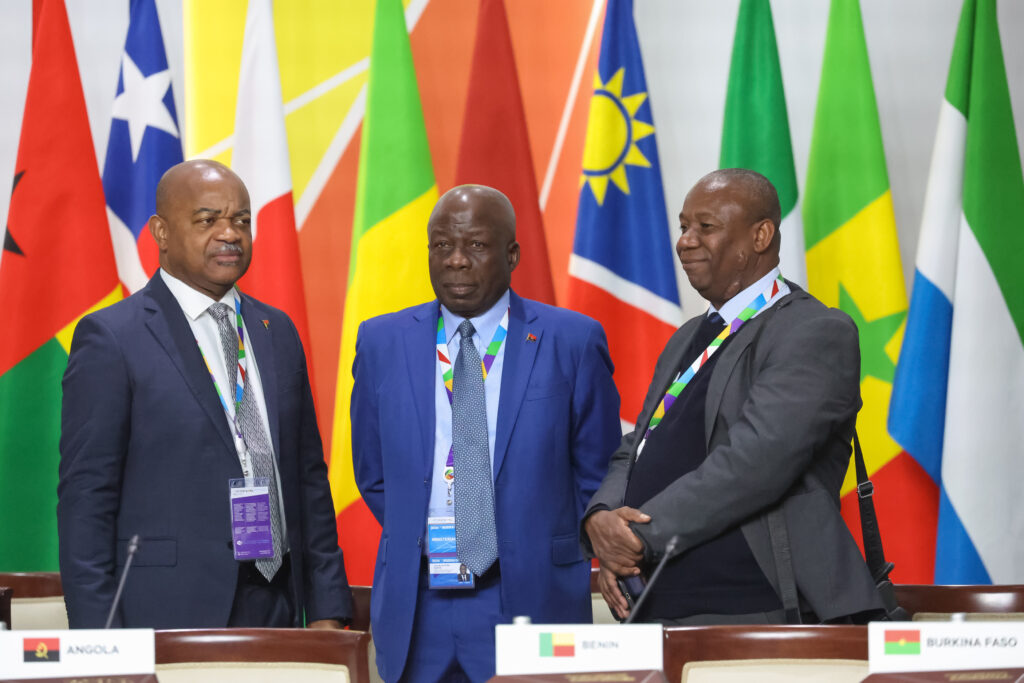
Security Cooperation
We emphasise the need for collective efforts and comprehensive approaches to review and strengthen the international peace and security architecture with an emphasis on addressing the root causes of both intrastate and interstate conflicts based on the inviolability of the principle of equal and indivisible security.
We reaffirm our readiness to work together towards strengthening and developing international policy frameworks for maintaining strategic stability, disarmament, arms control, and non-proliferation of weapons of mass destruction and their means of delivery.
We remain committed to the Treaty on the Non-Proliferation of Nuclear Weapons, and believe that ensuring its full implementation and achieving its universality at an early date are one of the priority tasks for maintaining the international security system.
We call for the full compliance with the Convention on the Prohibition of the Development, Production, Stockpiling and Use of Chemical Weapons and on their Destruction (CWC) for parties thereto, as an important instrument in the field of disarmament and non-proliferation. We reaffirm the support of all parties to this instrument for the Organisation for the Prohibition of Chemical Weapons (OPCW) and advocate a consensus decision-making with a view to overcoming divergences within the Organisation. We advocate the promotion of international cooperation, economic and technological development within the framework of the Convention.
We note the need to launch multilateral negotiations on an international convention to suppress acts of chemical and biological terrorism. We underline the paramount importance of respecting and strengthening the Convention on the Prohibition of the Development, Production and Stockpiling of Bacteriological (Biological) and Toxin Weapons and on their Destruction (BTWC) for parties thereto.
We underscore the paramount importance of accelerating the implementation of the resolutions on the Establishment of a Zone Free of Nuclear Weapons and other Weapons of Mass Destruction in the Middle East, including the Conference convened pursuant to UN General Assembly Decision 73/546. We call on all the invited parties to participate in this conference in good faith and engage in this effort constructively. We acknowledge the need for greater cooperation amongst the members of the UN Committee on the Peaceful Use of Outer Space and the commitment towards safeguarding the use of Outer Space exclusively for peaceful purposes and for the benefit of all humankind. We invite African States that arenot yet members to give consideration to applying for membership of the committee.
We encourage African States that are not yet members of COPUOS to consider joining with the view to participating in the constructive dialogue between space-faring nations and developing countries interested in safeguarding the use of Outer Space exclusively for peaceful purposes.
We recall the adoption of the African Space Policy and Strategy by the Assembly of the African Union at its twenty-sixth ordinary session, held in Addis Ababa on 30 and 31 January 2016, and that this achievement marks the first step towards the realization of an African outer space program within the framework of the African Union Agenda 2063, and note with satisfaction in that regard the establishment of the African Space Agency.
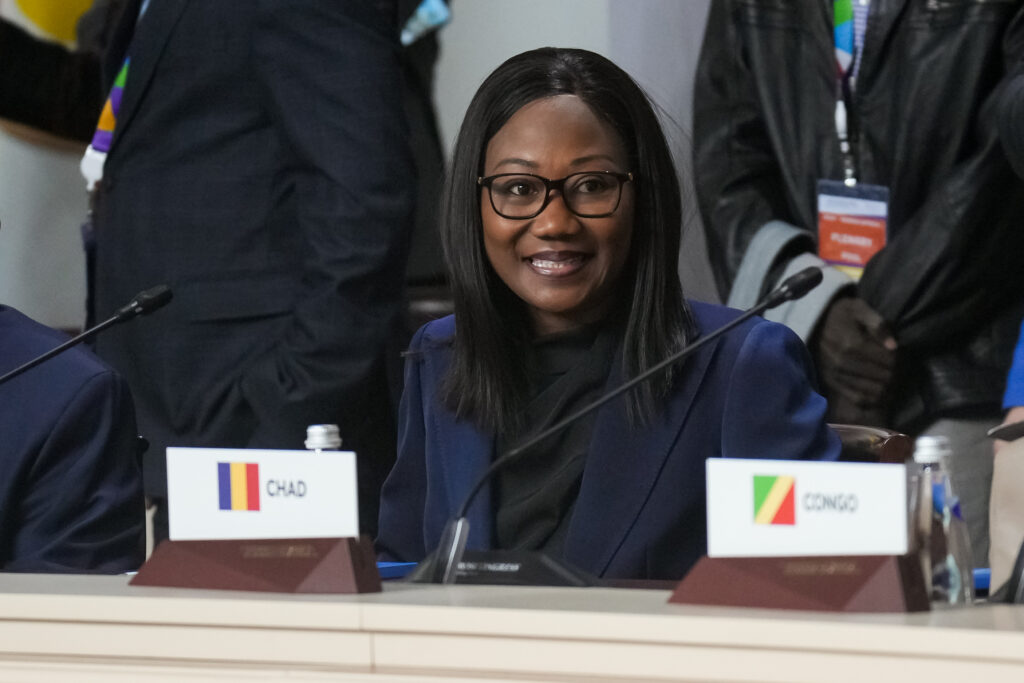
We reaffirm our determination to do the utmost to prevent an arms race in outer space (PAROS), including the placement of weapons in outer space and its transformation into an arena of military confrontation.
We recall the urgent need to negotiate a legally binding multilateral instrument providing for reliable guarantees for the prevention of the placement of any type of weapons in outer space and the threat or use of force against space objects.
We call for intensified efforts to shape a fair and equitable international information security system in line with the principles of sovereign equality of States and non-interference in their internal affairs.
We support the development of a universal legal framework aimed at preventing and peacefully resolving conflicts in the information and communication space, as well as preventing and countering the use of information and communications technologies for criminal purposes.
We also emphasize the importance of non-discriminatory implementation of the agreed voluntary rules, norms and principles for responsible State behaviour in this domain.
We intend to work towards establishing, under UN auspices, a single permanent negotiating mechanism on international information security that would operate on the principle of consensus and with the involvement of all States, in line with the agreement reached in July 2024 in the relevant Open-Ended Working Group.
We emphasise the need to improve the sustainability of national Internet segments and underline the importance of joint efforts to overcome the digital divide between States.
We confirm the importance of the principle of “African Solutions to African Problems” in conflict resolution. We stand ready to cooperate in preventing and resolving conflict situations, as well as in implementing specific measures to restore peace and stability on the African Continent. We also commit to efforts aimed at ensuring adequate, predictable, and sustainable financing for African Union-led Peace Support Operations authorised by the UN Security Council and under the Security Council’s authority consistent with the Chapter VIII of the UN Charter. In this regard, we undertake to collaborate closely towards the effective implementation of United Nations Security Council Resolution 2719 of December 21, 2023, which facilitates the requests from the African Union Peace and Security Council for authorisation from the United Nations Security Council for African Union-led Peace support operations under Chapters VII and VIII of the Charter to have access to the United Nations assessed contributions consistent with Article 17 of the Charter, as well as the financial regulations and rules of the United Nations.
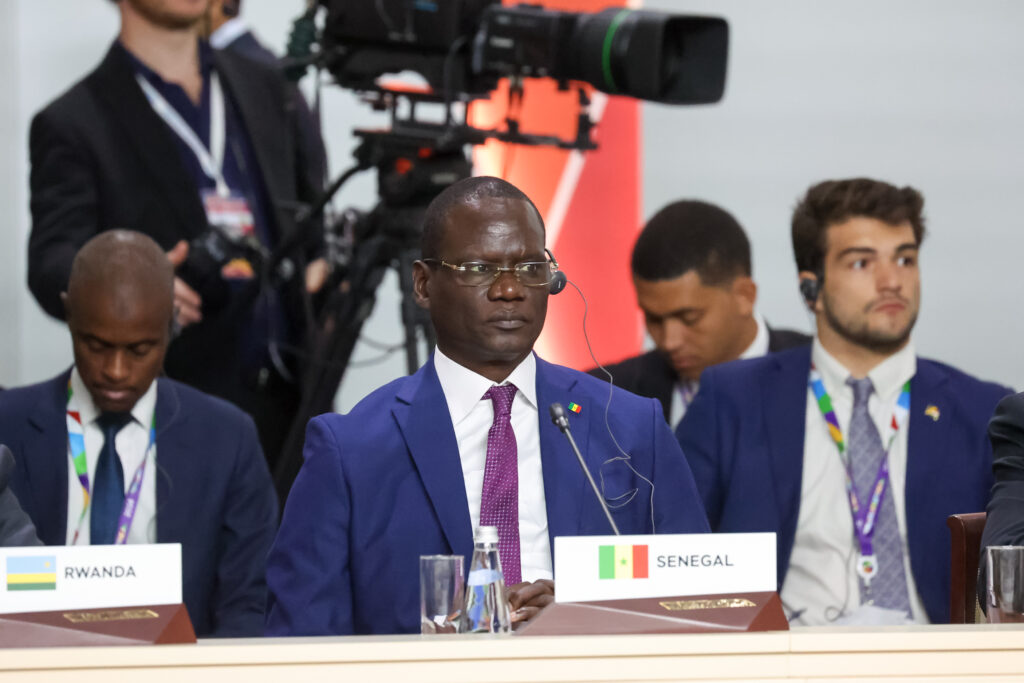
We reaffirm our commitment to respecting and applying international law and reject any other approach that deviates from this framework at the risk of leading to regional instability in Africa and we commit to favouring diplomatic and peaceful solutions, including through the encouragement of inclusive dialogue with a view to resolving crises and conflicts in Africa.
We highly commend the efforts of African States, the African Union and leading African integration organisations to advance the comprehensive peace settlement process. In this regard, we welcome the decision of the Leo Tolstoy International Peace Prize jury to award the first prize in its history to Africa, represented by the African Union, for the significant contribution to peacekeeping.
We reaffirm our readiness to set up a standing top-level Russia-Africa dialogue mechanism that will contribute towards peace, stability and security as well as coordinating efforts in combatting terrorism and extremism, addressing environmental problems and food and information security issues.
We express serious concern over the growing activity of terrorist organisations in different African regions and threats posed by these organisations to stability and security of African States.
We welcome the efforts of the African Union in the fight against terrorism, violent extremism conducive to terrorism and their prevention as well as the contribution of African institutions in this area, including the African Centre for the Study and Research on Terrorism (ACSRT) and the General Assembly of the African Police Cooperation Mechanism (AFRIPOL).
We strongly condemn all terrorist acts as unjustifiable crimes and reaffirm our commitment to combat terrorism in all its forms and manifestations as well as its financing and providing “safe havens” to terrorists. We strongly reaffirm that terrorism cannot and should not be associated with any religion, civilisation, nationality or ethnicity, and reiterate that all efforts tocounter it should be in line with international law, in particular the Charter of the United Nations.
We commend measures taken by the Russian Federation to assist counterterrorist efforts on the African continent, including through UNOCT programmatic activities.
We welcome the progress made in the framework of the cooperation of the relevant Russian and African government agencies, mutually recognised in the fight against the financing of terrorism and money laundering, and we hope for the continuation of joint efforts in the eradication of these scourges.
We aim to intensify cooperation in the fight against trafficking in narcotic drugs, psychotropic substances and their precursors, share information and best practices in this area, as well as on treatment and rehabilitation of persons who suffer from substance use disorders, prevention of drug use and promotion of healthy lifestyles.
We note with great concern the persistent disparities in progress made in ensuring the access, availability and affordability of controlled substances for medical and scientific purposes, particularly for pain relief and palliative care in developing countries, in particular, Africa and call for the removal of any barriers in this regard.
We acknowledge the complex and cross-border nature of transnational organised crime and reaffirm our commitment to further enhance cooperation in combatting transnational organised crime without politisation and double standards.
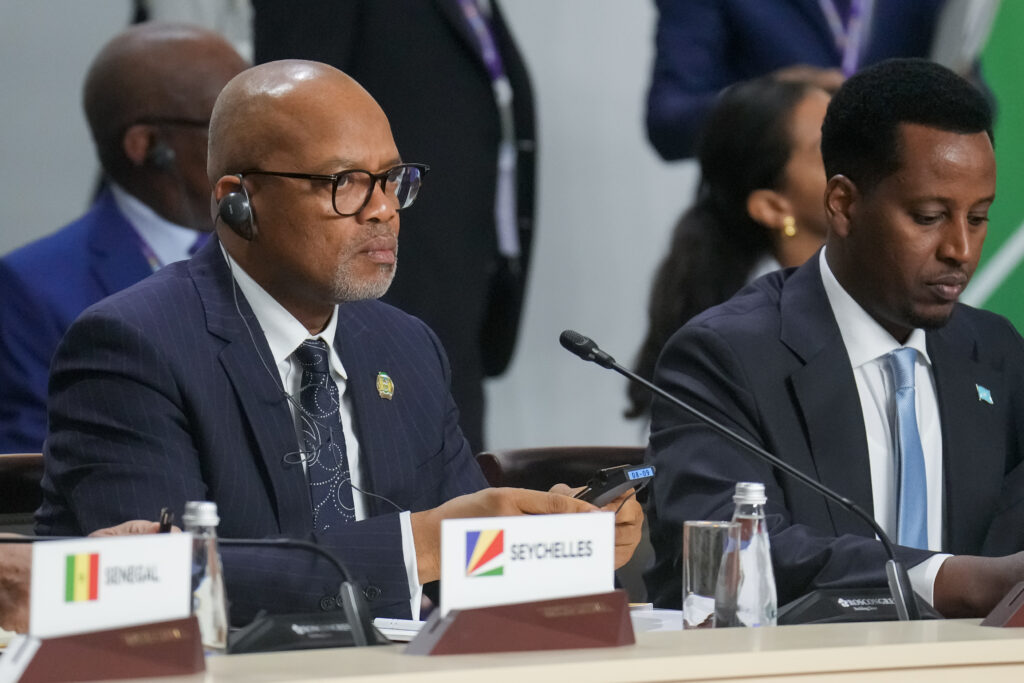
We welcome the finalisation of the United Nations Convention Against Cybercrime; Strengthening International Cooperation for Combating Certain Crimes Committed by Means of Information and Communications Technology Systems and for the Sharing of Evidence in Electronic Form of Serious Crimes and look forward to its early entry into force, and affirm our commitment to strengthen international cooperation in countering the use of Information and Communications Technologies for criminal purposes.
We remain concerned about the proliferation of small arms and light weapons, which continues to be a threat to the peace and security of the Continent, and underscore the importance of strengthening international cooperation for the implementation of “Silencing the Guns by 2030” in line with AU Agenda 2063.
We stay committed to combating piracy and armed robbery at sea. We reaffirm our readiness to further develop equitable international cooperation in this area, including by improving the combat capability and technical equipment of naval security forces.
Emphasising the continued pivotal contribution of the African Union and the Collective Security Treaty Organisation in ensuring and maintaining regional security and stability, we believe that there is good potential for collaboration between the organisations.
We are deeply concerned about the ongoing conflicts in the Middle East and the deterioration of the situation in the Occupied Palestinian Territory, in particular the unprecedented escalation of violence in the Gaza Strip as a result of the Israeli military operation, which led to a heavy toll in civilian casualties, large numbers of internally displaced persons and the destruction of civilian infrastructure.
We express alarm over the situation in Lebanon. We condemn the loss of civilian lives and the immense damage to civilian infrastructure resulting from attacks by Israel in residential areas in Lebanon and call for immediate cessation of military acts. We stress the need to preserve the sovereignty and territorial integrity of the State of Lebanon and to create conditions for political and diplomatic solution in order to safeguard peace and stability in the Middle East.
We support the full-fledged membership of Palestine in the United Nations, reaffirm commitment to the two-state solution on the generally recognised international legal basis, which comprises the pertaining UNSC and UNGA resolutions and the Arab Peace Initiative that provides for the establishment of a sovereign, independent, viable, peaceful and secure State of Palestine next to Israel in line with internationally recognised borders of June 1967 with East Jerusalem as its capital.
We therefore call for an immediate and comprehensive ceasefire leading to the release of hostages and detainees, the increase of provision and distribution of humanitarian aid as well as for the ensuring safe and unhindered access to all Palestinians in need, as provided in the recently adopted UNSC resolutions and welcome the continuous international and regional efforts in this regard.
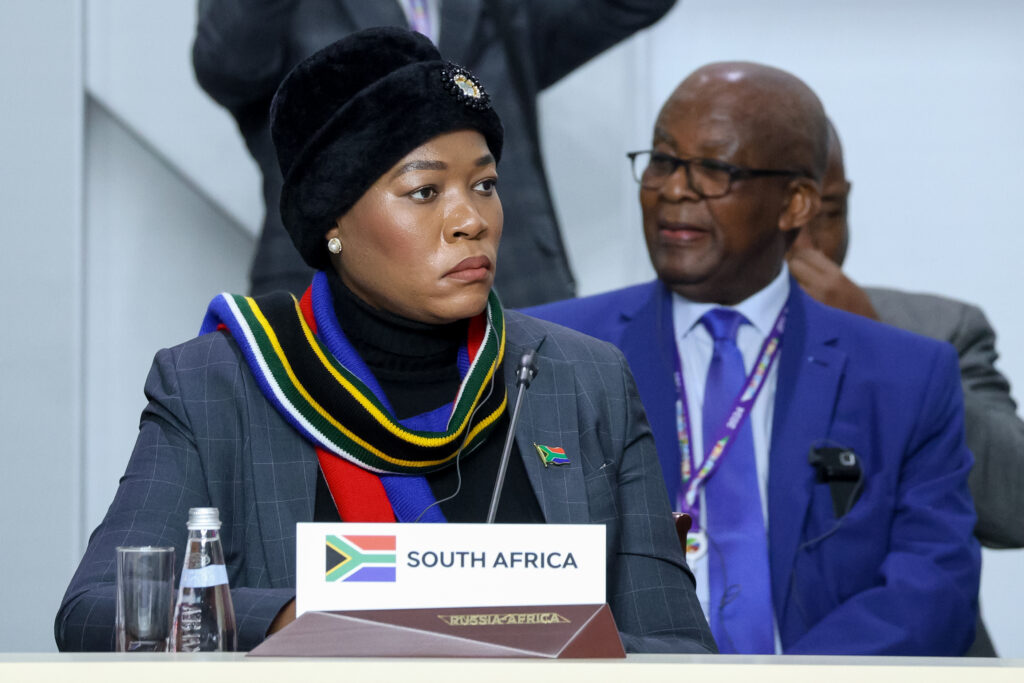
Trade and Economic Cooperation
We welcome the steady growth of national economies of African States, their effective multilevel economic integration, and the successful launch of the African Continental Free Trade Area, the world’s largest free-trade area.
We express our readiness to continue joint efforts to strengthen the voice and representation of the African continent in the global economic governance architecture. We therefore welcome the membership of the African Union in the G20, the premier forum for international economic and financial cooperation, through which we will continue our practical interaction.
We welcome South Africa’s Presidency of the G20 from 1 December 2024, the first time that an African country will steer this influential organisation.
We look forward to South Africa delivering an inclusive and progressive G20 Presidency which places the interests of the Global South, and Africa in particular, at the centre of the international economic agenda.
We welcome the increase in trade turnover, primarily in agricultural products, food and fertilisers, between the Russian Federation and African States, despite the unilateral coercive measures.
We underline the importance of our commitment to ensuring food security and nutrition, promoting agricultural efficiency and encourage further cooperation in these areas for modern agriculture and increased agricultural productivity and production in Africa.
We welcome the initiative of the Russian Federation to hold an International Food Safety Conference in Addis Ababa, Ethiopia, in 2025, with the participation of line agencies of the Russian Federation and African States, major Russian suppliers of food and fertilisers, experts in agriculture and scientists.
We take note of the implementation of the Russian initiative put forward during the second Russia-Africa Summit to donate Russian grain to the neediest countries of the continent.
We acknowledge the ongoing active work to improve the legal framework governing a broad range of Russia-Africa relations in trade, economy, credit and finance, science and technology and other areas.
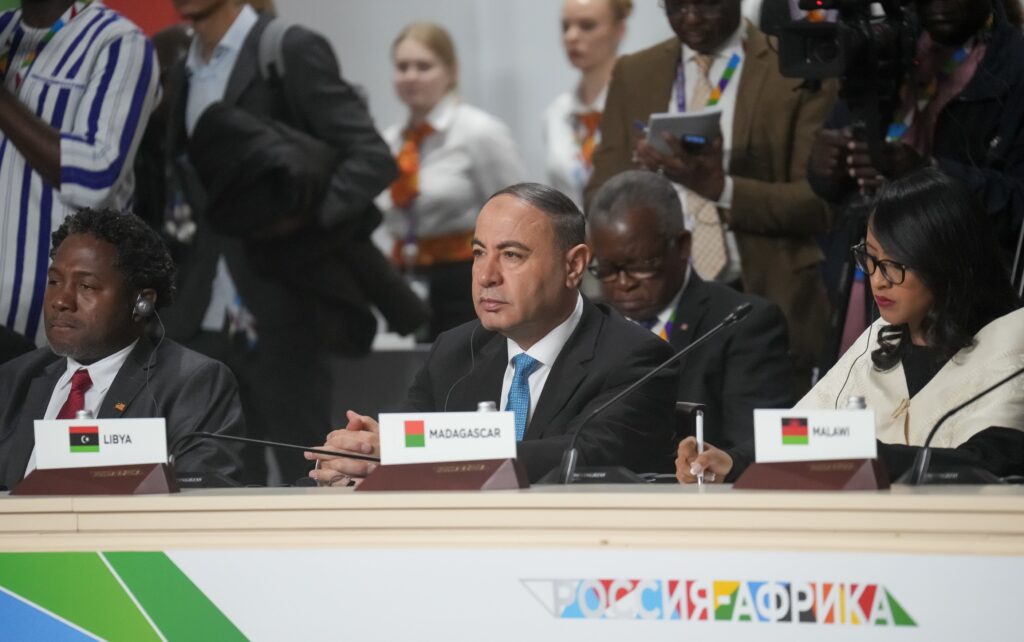
We are satisfied with the efforts of the Russian Federation and African countries to promote joint investment projects aimed at boosting the socio-economic development of States and strengthening their industrial and infrastructural sovereignty. We place special emphasis on deepening scientific, technical, innovation, industrial cooperation, improving the transport, logistics infrastructure, the mining sector, enhancing digitalisation, transfer of technologies, energy and non-energy uses of nuclear technologies as well as cooperation in the blue ocean-based economy.
We acknowledge the development of joint cooperation projects in the energy sector. We stress that guaranteed universal access to affordable, reliable, sustainable and modern energy is at the core of economic growth, social stability, global, regional and national energy security and the well-being of all peoples in the world. We stress the importance of expanding the use of national currencies in trade and financial transactions between the Russian Federation and the States of the African continent.
We emphasise the need to bring closer approaches to creating effective new international transport corridors and preserving the existing ones for the mutually beneficial economic development of the Russian Federation and African States. As a critical task, we emphasise the need to ensure their security in accordance with international law, including with a view to preventing the disruption of supply chains.
We deem necessary to strengthen the dialogue between the Eurasian Economic Union (EAEU) and the countries and leading integration organisations of the African continent and to support the efforts of the African States seeking to conclude Free Trade Agreements with the EAEU.
We reaffirm our strong support for a rules-based, fair, inclusive, and non-discriminatory multilateral trading system with the World Trade Organization (WTO) at its core.
We oppose unilateral trade restriction measures, which are inconsistent with the WTO rules, and the politicisation of international economic relations leading to the fragmentation of world trade, increased protectionism and unfair competition.
We stress the importance of reforming the World Trade Organization (WTO) through a member-driven, transparent and inclusive negotiating process. We underscore that an accessible, effective and fully-functioning WTO dispute settlement system is of paramount importance in ensuring the security and predictability of the multilateral trading system.
We condemn the use of unilateral coercive measures and urge the deterrence of any means of arbitrary or unjustifiable discrimination, political pressure, either explicit (unilateral coercive measures – UCMs) or hidden restrictive trade, market, logistical, financial, or humanitarian aid barriers (such as carbon border adjustment mechanisms – CBAMs), and underscore that such measures are unacceptable. We underline that illegal restrictions and their extraterritorial application impede free trade, have a negative impact on global supply chains, causing instability in the global food and energy markets, as well as on transport security, including civil aviation.
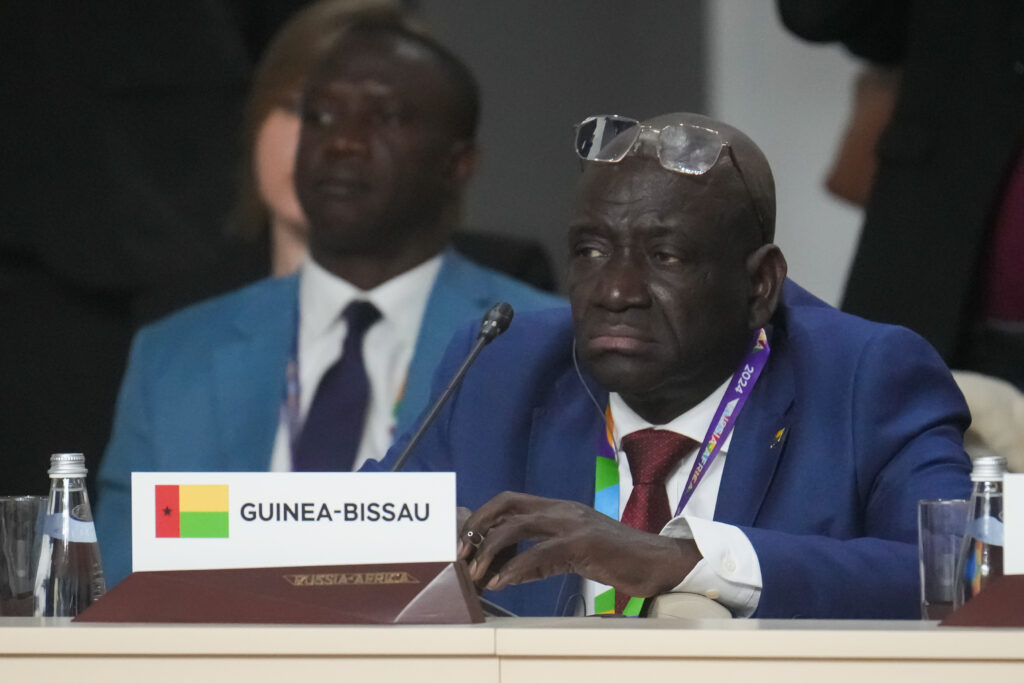
We are strongly in favour of reforming the rules and procedures of the International Monetary Fund and the World Bank in the interests of developing countries, in particular African countries, and their increased representation in these organisations’ senior positions. In this regard, we welcome the creation of an additional Executive Director position on the Fund’s Executive Board to represent Sub-Saharan Africa. We recognise the need to reform the policies and practices of the multilateral development banks (MDBs) in order to increase their lending capacity, mobilize finance from various sources, scale up their impact and to facilitate access to them for countries in need, including for development financing.
We take note of the intensified constructive and fruitful bilateral collaboration within the framework of the Kimberley Process, the only legitimate and universal international mechanism for regulating the world diamond industry, for the purpose of maintaining stability on the gemstone market, and welcome the greater interaction within the African Diamond Producers Association to ensure the sustainable development of the African diamond industry.
Education, Health, Culture, Sports, Youth Policy and Media Cooperation
We highly appreciate the strengthening of ties in the research and education fields between the Russian Federation and African States, the increased contacts between educational and scientific organisations, and the growing mutual interest of citizens of the Russian Federation and African countries in studying the Russian and African languages and culture.
We welcome initiatives to promote education, science, technology and innovation as part of the Year of Education 2024 declared by the African Union.
We commend the implementation of major projects by the Russian Federation and the African continent, including the steady increase in the quotas of State scholarships granted by the Russian Federation to African citizens to study at Russian higher education institutions, professional development programmes on priority qualifications for African partners, including technical and scientific-technical specialities, training of teaching staff for general education institutions in Africa, effective work of consortia of Russian and African universities – the Russian-African Network University (RAFU), the Subsoil of Africa International Consortium of Technical Universities, the Russian-African Network University of transport.
We welcome the dynamic cooperation between the Russian Federation and African States in the field of culture, including closer ties between relevant organisations and associations, increased delegation exchanges and touring activities, and the holding of cultural events in the Russian Federation and in the countries of the African continent.
We express our readiness to develop sports cooperation, including joint competitions, to support the participation of athletes in international competitions, exchange of delegations and experience between line organisations and associations, and to seek new areas of sports cooperation.
We emphasise that it is unacceptable to politicise science, culture and sport and to use them as a tool to discriminate against scientists, cultural workers and athletes on grounds of nationality, language, religion, political views or other beliefs, race or social background. We call for an equitable international engagement that is consistent with the spirit and principles of a multipolar world.
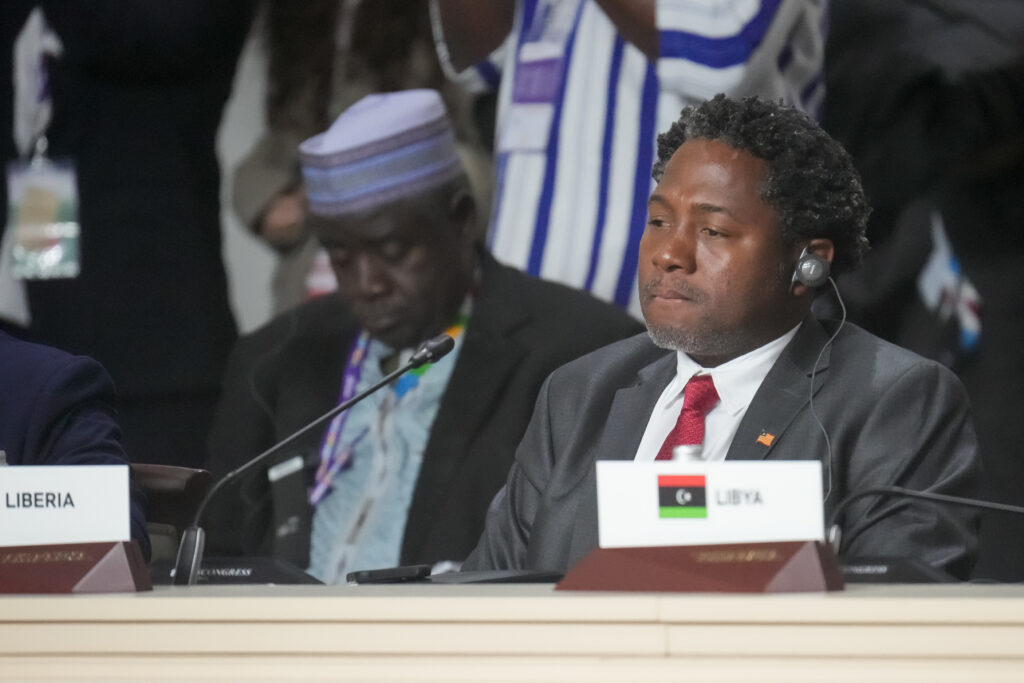
We acknowledge the strengthening of youth contacts between the Russian Federation and African countries, including within the framework of the World Youth Festival (1-7 March 2024, Russian Federation, Sirius Federal Territory).
We recognise the importance of the increased participation of women in political and socio-economic processes, including conflict prevention and resolution, peacebuilding, post-conflict recovery and development, as well as peacekeeping.
We reiterate our commitment to facilitating two-way tourism between African countries and the Russian Federation, participation in international line fora, and raising public awareness of the tourism opportunities of our countries.
We confirm increased efforts to strengthen African national public healthcare systems and capacities, including through transfer of technology, strengthening pandemic prevention, preparedness and response (PPPR) in Africa, with equitable access to healthcare services, safe, effective, quality and affordable life-saving medicines and vaccines, medical equipment, and training of African health professionals, and technology transfer and know-how for regional manufacturing and financing, including through the African Epidemic Fund.
We commend the cooperation in ensuring the sanitary and epidemiological well-being of the population of African countries, their resilience to emergencies, including outbreaks of dangerous infectious diseases, the improvement of laboratory infrastructure, implementation of joint research activities, as well as in training experts from line agencies. We welcome the First Joint Russian-African Conference on Combating Infectious Diseases held by the Russian Federation on 17-19 April 2024 in Kampala, Republic of Uganda.
We reaffirm our willingness to cooperate with a view to shaping the vision of a common information space that would secure freedom of dissemination and access to reliable and evidence-based materials. We recognise the importance of joint efforts to promote the dissemination of information that contributes to strengthening international peace and mutual understanding, developing friendly relations between States, and promoting traditional spiritual and moral values as a unifying force for humankind.
We welcome the strengthening of ties between the Russian and African media, the launch of Russian media bureaus on the African continent, and the implementation of relevant educational programmes for journalists.
We are aware of the need to strengthen the capacities of young people in using new information and communication technologies, the volunteer system and the promotion of cultural and sports exchanges between young people.
Environmental and Climate Cooperation
We advocate for stepping up efforts to consolidate approaches to international environmental and climate issues within the specialised UN fora to prevent the politicisation of work in these areas, and to ensure the right of each State to determine its own best tools and mechanisms for sustainable environmental management within a timeframe consistent with national circumstances.
We reaffirm our readiness to develop a mutually acceptable, fair and transparent carbon regulation system. We welcome and fully support the decisions of the 28th session of the Conference of the Parties to the UN Framework Convention on Climate Change.
At the same time, we call for the promotion of international cooperation on climate change based on the principles of common but differentiated responsibilities and respective capabilities, national interests and specificities of each country, as well as on the principles of technology neutrality, non-discriminatory access to appropriate funding, unhindered access and transfer of energy technologies as well as participation in research and development of these technologies.
We emphasise the importance of providing means of implementation through financial support and technological transfer and development and capacity building to African States as well as deciding on a New Collective Quantified Goal on climate finance at the 29th session of the Conference of the Parties to the UN Framework Convention on Climate Change (Baku, 11‑22 November 2024). The finance goal must reflect the needs and priorities of developing countries. Grant-based and highly concessional finance should be targeted at adaptation and loss and damage as the instruments of climate finance required to support ambition in developing countries.
We reiterate our commitment to working together to counter attempts by some States to exploit environmental and climate issues to raise additional tariff and non-tariff barriers against imports from the Global South and impose an accelerated «green» energy transition agenda and other measures that weaken the economic and industrial potential of developing countries.
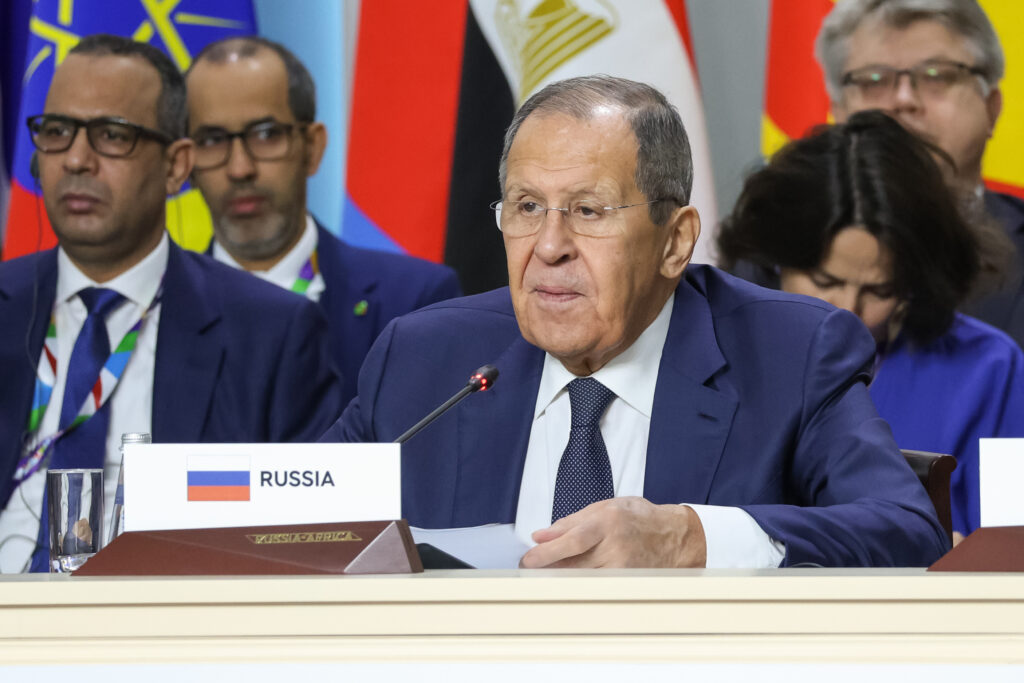
We reaffirm the importance of biodiversity conservation and emphasise the need for capacity building, innovative technologies and international cooperation to move forward on this issue.
We reiterate our commitment to enhance global action to combat desertification, land degradation and drought, to improve the resilience of population and ecosystems, to promote access to water with a view to promoting socio-economic development and poverty eradication.
We call for the strengthening of international cooperation to address plastic pollution while respecting specific national circumstances of each country.
***
The Ministers of Foreign Affairs of the Russian Federation and African States recognised by the United Nations, Leadership of the African Union Commission and the executive bodies of the leading African integration organisations, as well as their representatives, who participated in the First Ministerial Conference of the Russia‑Africa Partnership Forum express their commitment to further working together in order to expand cooperation and ensure the success of the third Russia-Africa Summit to be held in 2026.






